The Uninvited (1944)
Directed by: Lewis Allen
Written by: Dodie Smith, Dorothy Macardle, Frank Partos
Starring: Donald Crisp, Gail Russell, Ray Milland, Ruth Hussey
USA
AVAILABLE ON BLU-RAY AND DVD
RUNNING TIME: 99 min
REVIEWED BY: Dr Lenera, Official HCF Critic
In 1937, London music critic and composer Roderick “Rick” Fitzgerald and his sister Pamela fall in love with Windward House, an abandoned seaside house, during a holiday in Cornwall, and purchase it for an unusually low price from Commander Beech, who lives with his granddaughter Stella in the nearby town of Biddlecombe. Stella is deeply upset by the sale because of her attachment to the house, despite it being where her mother died. The Fitzgeralds’ initial enchantment with the house diminishes when they unlock an artist’s studio where they feel an inexplicable chill. Then, just before dawn, Rick hears the eerie sobs of an unseen woman. It seems that Windward House is haunted….
For some reason it’s taken me until now to watch this historically very important film; the first ghost story to come out of Hollywood that wasn’t a comedy or had the spooks explained away at the end as fake, and a film that both Martin Scorsese and Guillermo Del Toro have said is one of the best of its kind. To fully appreciate The Uninvited, one has to constantly remember that this was pretty much new stuff at the time, so it’s understandable that the filmmakers were treading quite carefully, muting the horror elements with comic relief, lush romantic music and the like, concentrating a great deal on plot and dialogue, and making a film that many modern viewers used to supernatural jolt-givers of the James Wan school will probably find both tame [it does only have a ‘PG’ certificate on DVD] and slow. The film, which plays like a more supernaturally inclined variation on Rebecca, does take its time, and the scares are spread rather thinly, but there are some extremely effective moments which should still have a good effect if the film is watched at the right time [late at night with all the lights out], and some sections do have a very creepy atmosphere. The story is very compelling and even ends up becoming rather surprising, while the slight feeling of cosiness is actually kind of appropriate considering that many of the old Victorian ghost tales were as much about reassurance as they were about fright. I liked it a lot, once I realised that it wasn’t going to work me up throughout like The Haunting, The Innocents or – dare I say – The Conjuring 2!
This film, a rare excursion into horror by Paramount [and even the Universal horror series that was still going on at the time avoided ghosts] was based on a book of the same title written in 1942 by Dorothy MacArdle. The screenplay by Dodie Smith [best known for writing the novel The Hundred And One Dalmations] and Frank Partos reduced the number of characters but kept the gist of the story and retained lots of its dialogue verbatim, including a reference to a priest which in the film doesn’t make sense because said priest was actually a character in the book who doesn’t appear in the movie. Helen Walker and Veronica Lake were tested for the lead female roles before Ruth Hussey and Gail Russell took the parts. The film was partly shot on the same sets as the comedy I Married A Witch. After completion, Paramount, against the wishes of director Lewis Allen, decided to add some special effects shots to make the supernatural aspects more obvious. However, when The Uninvited was released in the UK, those shots were removed by the ridiculously sensitive British censors anyway and the film wasn’t seen uncut here for several decades. It was nonetheless a hit, leading to two radio adaptations being broadcast in 1944 and 1949 respectively, the first with Ray Milland and Hussey reprising their roles, the second with just Milland doing so.
Composer Victor Young’s gorgeous tune Stella By Starlight, which became a hit three years later and is noticeably similar to As Time Goes By in one part, seems like an odd way to open a supposedly scary film about ghosts to modern ears, but it was obviously felt necessary to ease the viewer into what was in a sense a new type of movie for 1944. You may be sick of it by the end of the film though as it’s played endlessly throughout. After some rather portentous, and, to be honest, rather unnecessary scene setting from the voice of Rick, we have our couple [well, they’re a brother and sister but at times seemed a little too friendly to me, though the film has a subtle theme of ‘deviant’ sexuality elsewhere so it’s possible that this was intended] find the house that they immediately want to buy, though the emphasis is on humour with their dog chasing a squirrel into the house, replete with cartoon-like comical music, though it’s convincingly done with no visible fakery. The story then takes its time to try to get to the point, and there’s an especially heavy emphasis on the romance between Rick [actor aged 37] and Stella [actress aged 20], the rather strange girl who once lived in the house as a very young child and whose mother fell off the cliff to her death.
Of course it soon seems pretty obvious who the unseen ghost who makes flowers wilt and cries at night is, but it then appears that a second ghost is also around and far less friendly than the first. The midsection contains most of the film’s most creepy moments, like a supposedly fake séance [to try to get Stella to stop trying to talk to her dead mother] which turns real, and a really unsettling moment when Rick is playing the piano, the candles briefly go out and his music briefly turns dark in tone. The way cinematographer Charles Lang uses shadows in many scenes, sometimes so they seem to have a life of their own, also works well in helping to create the right atmosphere. The film does seem to lose its pace, which was very leisurely in the first place, somewhat after a while and relies on lots of explanatory conversations to answer much of its mysteries, but the plot has at least one surprise which caught me off guard. The final confrontation seems to end before it’s begun, but the depiction of the second ghost is amazingly effective; there’s something just so eerie and unsettling about the face in particular. I do think that the film would, in the end, have worked better without the three or four explicitly supernatural visions though. For a start, it would have strengthened the psychological dimension that the screenplay carries with it. Saying that, the effects do still look rather good and haven’t really substantially been improved upon since despite all this digital technology filmmakers now have at their disposal.
Though subtle by modern standards, it sometimes seems that the censors slept through some of this movie, be it the extremely obvious fixation the lesbian [not a sympathetically portrayed one, it must be said – she even runs some kind of odd correctional facility for ‘insane’ women] Miss Holloway has for Stella’s mother, or a moment – which probably wasn’t intended to be rude but can’t help but seem that way – when Stella is hiding under the steering wheel in Rick’s car and, lifting her head up, looking rather dishevelled, says: “O what a moment”. Rick’s reply of “What, you scared?”, is then followed by her reply of: “Yes, but it was wonderful”. The enigmatic Stella is an interesting character and her determination to see more of her mother against everyone else’s wishes is very touchingly portrayed by Gail Russell [despite being billed eighth in the cast], this part of the story adding a strong, relatable emotional dimension. The Cornish setting, despite being nearly all studio bound, is surprisingly well evoked and the main house a very memorable main locale with its dark corridors and rooms with odd details in them, though it’s strange that, despite there being an electric radio and what looks like a gas lamp in the house, everybody just seems to use candles all the time.
Allen, generally a journeyman director who made little else of note, handles this Gothic material fairly well and should have made more films in this vein. Milland is a tad awkward, though Hussey is fine aside from a couple of bits where she seems to struggle to provide a convincing reaction to something. Young’s score overdoes the soppy strings throughout but interestingly avoids scoring most of the ghost stuff, these bits being made more effective as a result. The Uninivited only chilled me sporadically and even then not as much as I had hoped for, but its mature approach [bits of humour notwithstanding] to its subject probably means that it’ll remain in my mind long after many of the modern ghost movies, as good as some of them are, have faded away. In fact, in the end, it’s a rather calming, even comforting film that reminds us that we shouldn’t necessarily be afraid of the undead, who can sometimes provide healing and warmth as well as the more commonly depicted things. After all, doesn’t our fascination with ghosts stem from us trying to cope with death, and hoping against the most futile odds that death isn’t the end?

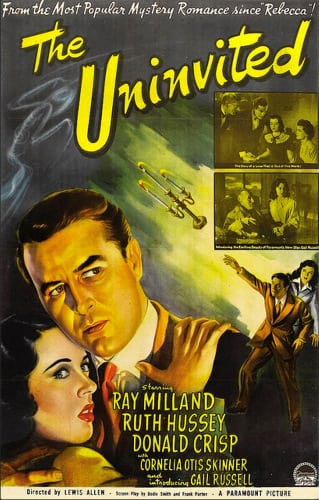
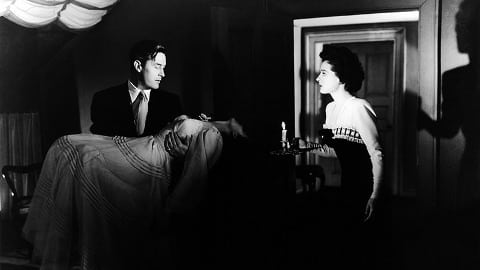
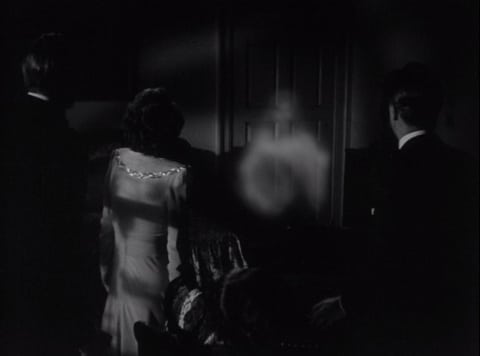





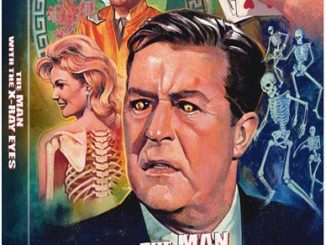
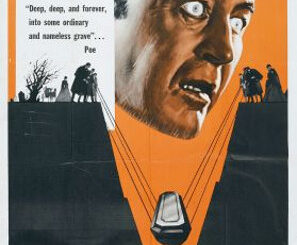
Be the first to comment